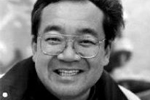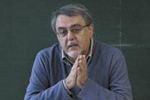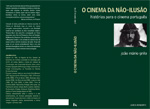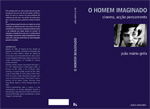|
 |
PARALLEL
ACTIVITIES
MASTERCLASSES
CONFERENCE AND DEBATE WITH ALAIN BERGALA
ABOUT CINEMA EDUCATION
WORKSHOP “Single Shots”, held by
Alain Bergala
JOÃO MÁRIO GRILO presents
two new books on film theory and criticism
AT THE CAFÉ CINEMA (with
Marie-Pierre Müller
and João Botelho)
WORKSHOP SONY
LISBON DOCS PITCHING SESSION
All this events are of free entrance but require enrolment.
Enrolment in the Masterclasses and more information through the
e-mail anacristina@doclisboa.org
MASTERCLASSES
 AMOS
GITAI AMOS
GITAI
October 21st | 16.30 | Large auditorium
In the context of doclisboa’s retrospective dedicated to his works, the
Israeli director Amos Gitai will give a conference and meet with audiences at
the festival, where he will speak about his vast body of documentary works -
with a special emphasis on the two trilogies being screened here - and about
his work methods. Gitai will also approach the multiple threads that link these
documentaries with his fictional films, namely, a focus on Israel’s recent
history and themes/figures such as the land, exile and memory.
 MAKOTO
SATÔ MAKOTO
SATÔ
October 25th | 11.00 | Large auditorium
Part of this year’s programming dedicated to contemporary Japanese
documentaries, DocLisboa presents a masterclass with Makoto Satô.
This is a rare opportunity to listen to one of Japan’s most
illustrious and influential filmmakers (and that’s not all,
Satô is also a professor and a historian of documentary cinema)
talk about his work, his affiliation with a tradition of Japanese
documentaries that deal with social issues (as can be seen in his
two films being screened during the festival: “Living on the
River Agano” and “Memories of Agano”) and the current
state of documentary cinema in his country, which he portrays with
a somewhat critical eye.
 ADRIAN WOOD ADRIAN WOOD
October 26th | 16.30 | Large auditorium
"Hidden Treasure - the Wonders of Archives" - Tracking down the right
piece of archive footage sometimes takes the skills of a detective. You might
be looking for it in the wrong places, and you might end up paying for it,
when you actually could get it for free. And if you are not careful, you can
end up wrestling with law suits. Come and learn with Adrian Wood - where to
look, and how to avoid problems.
Moderator: Leena Pasanen
CONFERENCE AND DEBATE WITH ALAIN BERGALA ABOUT CINEMA EDUCATION
DIALOGUES: ALAIN BERGALA AND JOÃO MÁRIO GRILO
October 22 | 15.00 | Fórum debate
“Transmission is one of cinema’s favourite subjects.
For the simple reason that transmission more often than not occurs
in the form of writings, inscriptions, circulation and repetition,
especially unconsciously, of a meaning. And cinema is one of the
best placed arts in this field, due to its temporal development and
its visual and audio aspects, immediately making this meaning tangible
and thus allowing its circulation and transmission.”
Alain Bergala in L’Hypothèse cinéma. Petir traité de
transmission du cinéma à l’école et ailleurs.
 Alain Bergala, the noted French critic, professor and filmmaker,
will be present at DocLisboa to develop the workshop “First
Shots”, aimed at disseminating cinema education amongst youngsters.
He will also present a conference/debate about the importance of
transmitting cinema (and knowledge pertaining to cinema) to students
and the younger generation and the various options available. Bergala
has authored a “small treatise” on cinema education,
based on his own experiences, where he puts forth concrete suggestions
and possibilities for teaching methods in the field of cinematographic
images, stressing the importance of including such programmes in
school curricula (during different stages of education) in an innovative
manner. Alain Bergala, the noted French critic, professor and filmmaker,
will be present at DocLisboa to develop the workshop “First
Shots”, aimed at disseminating cinema education amongst youngsters.
He will also present a conference/debate about the importance of
transmitting cinema (and knowledge pertaining to cinema) to students
and the younger generation and the various options available. Bergala
has authored a “small treatise” on cinema education,
based on his own experiences, where he puts forth concrete suggestions
and possibilities for teaching methods in the field of cinematographic
images, stressing the importance of including such programmes in
school curricula (during different stages of education) in an innovative
manner.
More specifically, Bergala will discuss the inclusion of cinema education
as an art, seeking to respond to the notion of what this education
could really mean, along with issues such as primary contacts with
images and whether it is possible to teach cinema without practical
experiences and without understanding and analysing it – questions
that everybody who works in the area of cinematic education faces.
Bergala’s work likewise represents an act of resistance on
the part of cinema and one of adapting to the technological possibilities
afforded by new forms of recording and reproduction.
This debate is an opportunity to discuss ideas, strategies and experiences
about cinema education, and will be enriched by the participation
of professors from diverse educational institutions in Portugal who
are working in this field.
Workshop “Single Shots”,
held by Alain Bergala
October 21, 22, 23 – Fórum
debate
This workshop is another novel feature of doclisboa 2006 and contributes
towards realising another of the festival’s objectives: pedagogical
questions related to the education and training of a younger generation
via cinema.
Directed by Alain Bergala, director, professor, essayist and specialist
in the transmission of knowledge and cinematic practices, this workshop
seeks to train the gaze of and encourage cinematographic creation
by youngsters. The purpose of the workshop is to make films with
a single shot that lasts one minute, just like the films by the Lumière
brothers.
 Single Shots Single Shots
The rule of the game of the Lumière shot is simple. Just as
in the time of the Lumière operators (colour and especially
sound) each participant chooses a place, a moment, a framing, a subject,
and films a one-minute shot with a fixed camera.
To film a Lumière shot is to return to the origin and the
essence itself of cinema. To film a Lumière shot is to find
yourself plunging into the heart of the cinematographic act, in the
face of all the essential choices of “filming a shot”.
It is a foundational and unforgettable individual experience, where
each one has the personal responsibility of all fundamental choices
of the cinematographic creation.
There is nothing more beautiful, more pure, more pitiless than a
Lumière shot. It is not possible for one to fake, pretend
or hide away. Everything about who made it is rendered visible: his
relation to the world, his relation to cinema, his intentions, his
weaknesses or his strengths (but there can be strengths which are
weaknesses and weaknesses which are strengths), his fortune or his
misfortune.
In a Lumière shot there is the essential
of cinema:
The choice of subject
The relation with the one who is filmed
The question of the attack
The question of the relation with the spectator: how one poses on
him an expectation and how he reacts, or not, in sequence
The question of rhythm, of the off status, of the ambiance
The question of natural light and of sound
The question of dexterity and of chance
Cinema is always youthful when it truly starts off from the gesture
which founded it, from its origins. When someone picks up a camera
and faces reality for a minute, in a fixed frame, in a state of acute
awareness in a relation to everything than will happen holding his
breath before all which is sacred and irreparable in the feat of
a camera capturing the fragility of the moment, with the violent
feeling that that moment is unique and will never repeat itself in
the course of time, cinema is reborn to him just as on the day when
a camera filmed for the first time. When one is in what exists as
innate in the cinematographic act, one is always the first film director,
from Louis Lumière to a young lady or a young man of today.
All it requires is enough innocence and faith in order not to start
at once hundred years of public life have forcibly been brought on
to the cinema.
It is perhaps the essential of cinema discovered by those who made
this film: that filming a shot is already to be in the heart of the
cinematographic act, that in the raw act of capturing a minute of
the world is contained all the strength of cinema and, above all,
this belief in return that the world is always surprising, never
such as we aspect it to be or foresee it, and that cinema is always
stronger than the one who makes it.
Alain Bergala
João Mário
Grilo presents two new books on film theory and criticism
October 21th | Fórum
debates | 18.00
A film scholar and filmmaker, João Mário Grilo has
recently published two anthologies of his film related writings
which we are proud to present in doclisboa.
“O Homem Imaginado. Cinema, Acção, Pensamento.” [“Imagined
Man. Film, Action, Thinking” is a comprehensive compilation of essays on
film theory and criticism published in the last twenty years in various publications.
“O Cinema da Não Ilusão” [Non Ilusion Cinema. Histories
for Portuguese Cinema] is also a colection of articles written about contemporary
portuguese film, that try to locate the specificity of national film in a paradigm
once defined by the “Cinema Novo” in the 60’s and developed
through essential films such as Acto de Primavera and Amor de Perdição
by Manoel de Oliveira or Trás-os-Montes by António Reis e Margarida
Cordeiro.
At the Café CINEMA (with Marie-Pierre Müller
and João Botelho)
October 25th | 23.30 | Fórum debates
Who has not, one day or other, had the feeling that
films talk to each other, that, through the viewer, they are leading
long-running conversations? What film buff has not played with
others at bringing together instants from films which, together,
tell one of the many histories of cinema? Who among us has not
thought, one day, thinking of a film sequence: ‘That said it all…’?
‘That’ shot. ‘Just that tracking sequence’. ‘When
the character says… when she does…’ The editing, the sound,
the moment, the sequence to replace all others. A glance that is meant for
me alone. The figure of the cinema and its incredible adventures: from the
giddying zoom to the violence of the close-up. The moment of grace in a documentary,
the reward for obstinacy. Style that resists rhetoric. So what do they say,
these scraps of film, these connections, these fragments?
Sometimes it just takes a few minutes, or twice that, to say ‘all
there is to say’ about the cutting, the montage rhythm and
effects, the power of the frame, the power of duration, the real
weight of the words and the discrete functioning of the sound, the
power or elegance of the solutions provided by the mise en scène for
the most complex, the most delicate or the most dangerously simple
of situations…
And in the conversations that they hold among themselves, films laugh
at the ‘genre’ labels they are given, however correct
they may be. In the memory and in the heart of every film buff, a
sort of gallery is built up of sequences and shots, an imaginary
anti-museum with an unstable collection, where the arrangement changes
with each film encountered. It is a source
of the greatest pleasure to talk about and show these personal collections,
for they belong to all; it is – always – a chance to
reassess a relationship with cinema, to interrogate without respite
its most basic elements.
We know that the film buff’s internal museum is shifting, unstable,
almost fragile. That she is nevertheless animated by convictions,
certainties. Struck by bolts of lightning. Possessed by unforgettable
emotions – poignant, definitive, incurable emotions. And that
this can be told. The way you can tell a dream. The way you tell
a story, to someone you trust.
This is all about something simple: bringing your museum along with
you, showing it, having people visit it. Then asking the others (to
help you ask yourself better) what is strange about it, what is common
about it. Ask plenty of people ‘what’ it is talking about,
and how. It is in a bar which has been curiously furnished with television
screens that we make our bet that it is possible to ‘talk cinema’ without
being either master or pupil. Through hesitation, risk, shyness.
Through passion, through improvisation. Through the discovery that
you can do it because there are more of you, seeking, catching glimpses.
Through the wealth of intuition because you are watching together.
Through the pleasure of a word that is more sure of itself because
it is responding to another. Armed with out cassettes and DVDs, and
certain that we shall not be the only ones to bring some along to ‘the
café’, we propose a journey through two histories of
the cinema. A story of pursuit, and a story of the night. Pursuit,
figure and posture: the filmmaker is a tracker, she talks sometimes
of being in hiding and on the lookout, even of setting traps. This
fits no shortage of sequences in which the viewer watches the time
of waiting and the drama of capture, death approaching before his
eyes. At this moment, more than ever, it is a question of place.
When the night falls, the film or magnetic tape can only record the
contrary, the flicker of light that remains. But in the darkened
cinema the dramas of noir unfold. At this point in our lives
and in the real world, when we are at once condemned to powerlessness
and freed of control, the cinema takes on a terrible and paradoxical
power.
Marie-Pierre Duhamel Müller
WORKSHOP SONY
October 27th | 10.00 – 13.30 | FÓRUM
DEBATES
Maximum 15 Participants (enrolment required)
Target: Film professionals and students
 PITCHING SESSION PITCHING SESSION
October 28th – 10:00 – Small
auditorium
15 projects, previously selected by EDN for their potential appeal
to the international market and developed during 3-day workshop,
are presented to a panel of decision-makers from documentary funding
institutions and leading European channels in international co-productions.
It's a show of what we can expect from documentarists in Portugal
and other European countries. 15 minutes are given to each project
- half of the time to the producers/directors, the other half to
reactions from the Experts. The main goal of a Pitching Session is
to secure financing for documentary projects. Thus, to be in the
audience is a unique chance to observe what works and what does not
work in today’s international non-fiction market!
Moderators: Leena Pasanen and Cecilia Lindin.
|


 AMOS
GITAI
AMOS
GITAI  MAKOTO
SATÔ
MAKOTO
SATÔ  ADRIAN WOOD
ADRIAN WOOD
 Single Shots
Single Shots

 PITCHING SESSION
PITCHING SESSION